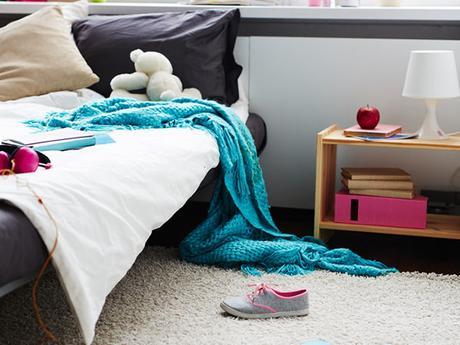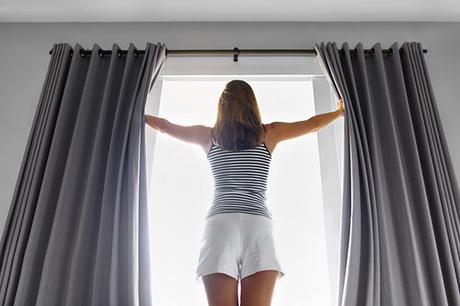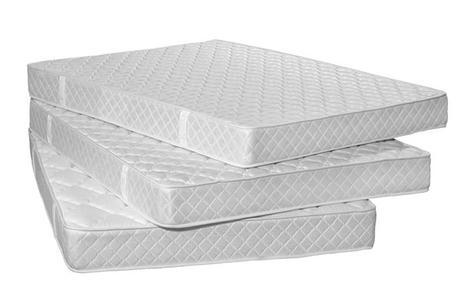If you’re having trouble sleeping, your room should be one of the first things you should assess. Your sleep environment can be the difference between a good night’s sleep and a bad one. This includes the lighting, the room temperature, bed surface, pillows, noise, etc. Your room should be a sanctuary, a place of rest, and not associated with stress. It should be where you can relax, rest, and feel comfortable enough to get sufficient sleep.
To help you improve your bedroom for better sleep, follow these guidelines:
#1 Declutter and rearrange
Many people often leave clothes and other objects lying around the room. Some have a pile of clothes that are not dirty, but also not very clean that you’d put it back in the closet. It may be time for you to declutter and rearrange. There are many ways you can keep your room organized. There are bookshelves, hooks on the wall, boxes under the bed, a laundry basket, etc.

#2 Get blinds or curtains
Day and night or light and darkness are what tells our body that it’s time to sleep or to be awake. So it’s no wonder why lighting plays a role in sleep. Some may need some nightlights to sleep, but generally, the room needs to be dim or dark or free from bright lights. Even lights from a cell phone or gadget can be enough to keep you up.
Curtains and blinds are necessary both for privacy and to keep light out. If you sleep during the day and work at night, curtains are crucial. But even for night sleepers, curtains can block any flashes of light from outside like from a passing car.

#3 Assess your mattress, pillows, and covers
Comfort is a major key to good sleep. Mattresses and pillows can be expensive (especially the right kinds), but you should consider it as an investment. When you get decent beds and pillows, you’re investing in your health because sleep is essential for good health. You’re also investing in a better life because when you sleep better, you can do better at other things.
If you find yourself getting backaches, neck pain, and not getting enough sleep, it may be time to change your mattress, pillows, or both. There are a lot of factors to consider when buying these things but the key is to find the right balance of softness and support. Too soft or too firm can be bad for your spine and disrupt your sleep. If buying a whole new mattress is too much, you can go for the cheaper option of getting a mattress topper.
There are different kinds of foam material for your mattress; to name a few, there’s latex, memory foam, and box spring. I would recommend latex because it offers great support and it’s very durable too. However, it is quite pricey. Memory foam also provides great support, but it can give a sinking feeling because it’s temperature sensitive.
Pillows are also crucial. The right one is supportive yet still very comfortable, and memory foam pillows can offer you just that. There’s also wool, cotton, latex, and many other types of pillows you can choose from.
The best way to choose the right mattress and pillow is to give them a try. Many stores will allow you to test their products before you purchase them.

#4 Use your thermostat
It would be hard to sleep if the room was too hot or too cold, wouldn’t it? Sleep experts say that a suitable temperature to help you sleep is around 60-67 degrees Fahrenheit. Adjust your thermostat accordingly to help you sleep faster and better.
For winter, use a duvet to help you keep warm. In summer, you can use a light blanket and also wear light clothing. It will also help if you open your windows during the day to keep the room from becoming stuffy.
#5 Manage the sounds around you
Most people have a hard time sleeping with noise in the background. It could be a party next door, your family in the living room, or even just the sound of a ticking clock. On the other hand, some people can sleep faster and better with sounds in the background.
If you need silence, close the doors and windows to block the noise from outside. If that doesn’t work, then try earplugs. For those who need some noise, invest in a white noise machine, or play some from a music player.

Other tips for you to sleep better
- Turn electronics off. Nowadays, people rob themselves of sleep by staying up in front of cellphone and scrolling through social media. If you want more sleep, turn it off.
- Avoid coffee and other caffeinated drinks beyond 2 in the afternoon. You should also not eat too close to bedtime.
- Don’t skip your workout, but don’t make it too close to bedtime either.
- Stick to a schedule. Try to sleep and wake up at the same time each day.
- A hot shower can help you fall asleep fast and good. However, don’t do it too close to bedtime. Try to do it at least an hour and a half before you hit the sack.
Conclusion
Nothing is better than starting your day feeling recharged and ready for the day ahead. A significant factor that affects this is the quality of sleep we get the night before. That’s why it’s important that your bedroom is conducive to sleep. If you’re having trouble sleeping, assess your room and make the necessary changes. Many times, such a strategy can solve the problem right away, but if it doesn’t look into the other factors.
If you have any questions or concerns, feel free to use the comment section below. You can also share your tips if you have any. We’d love to hear them!
